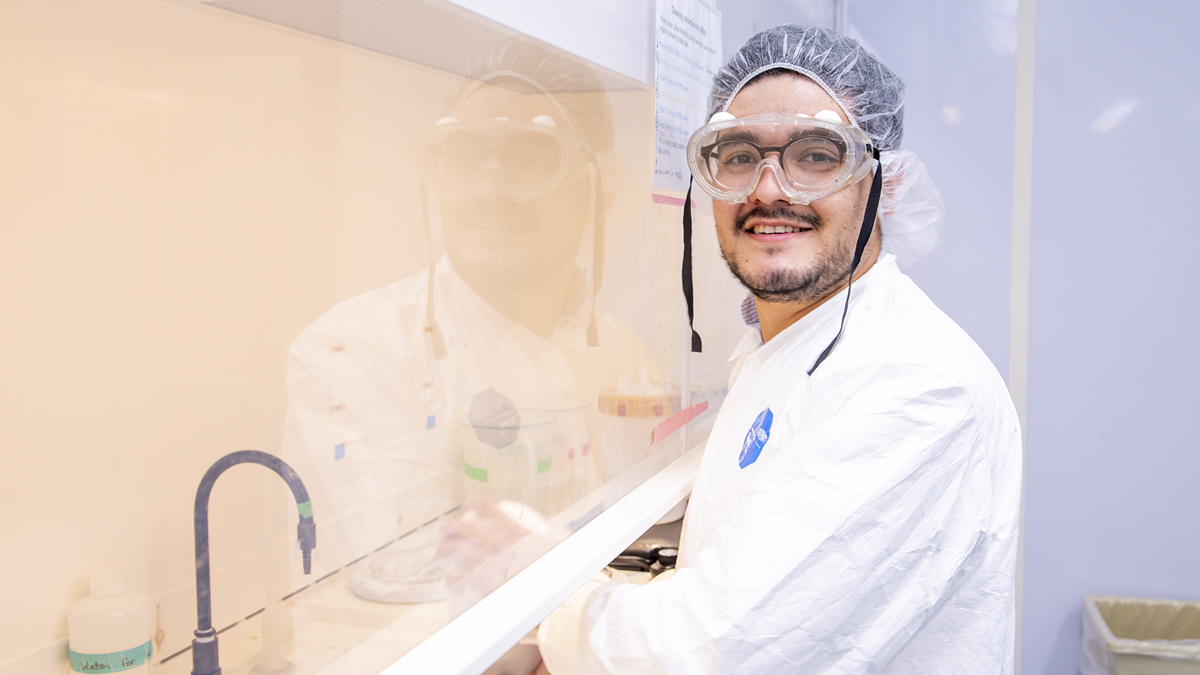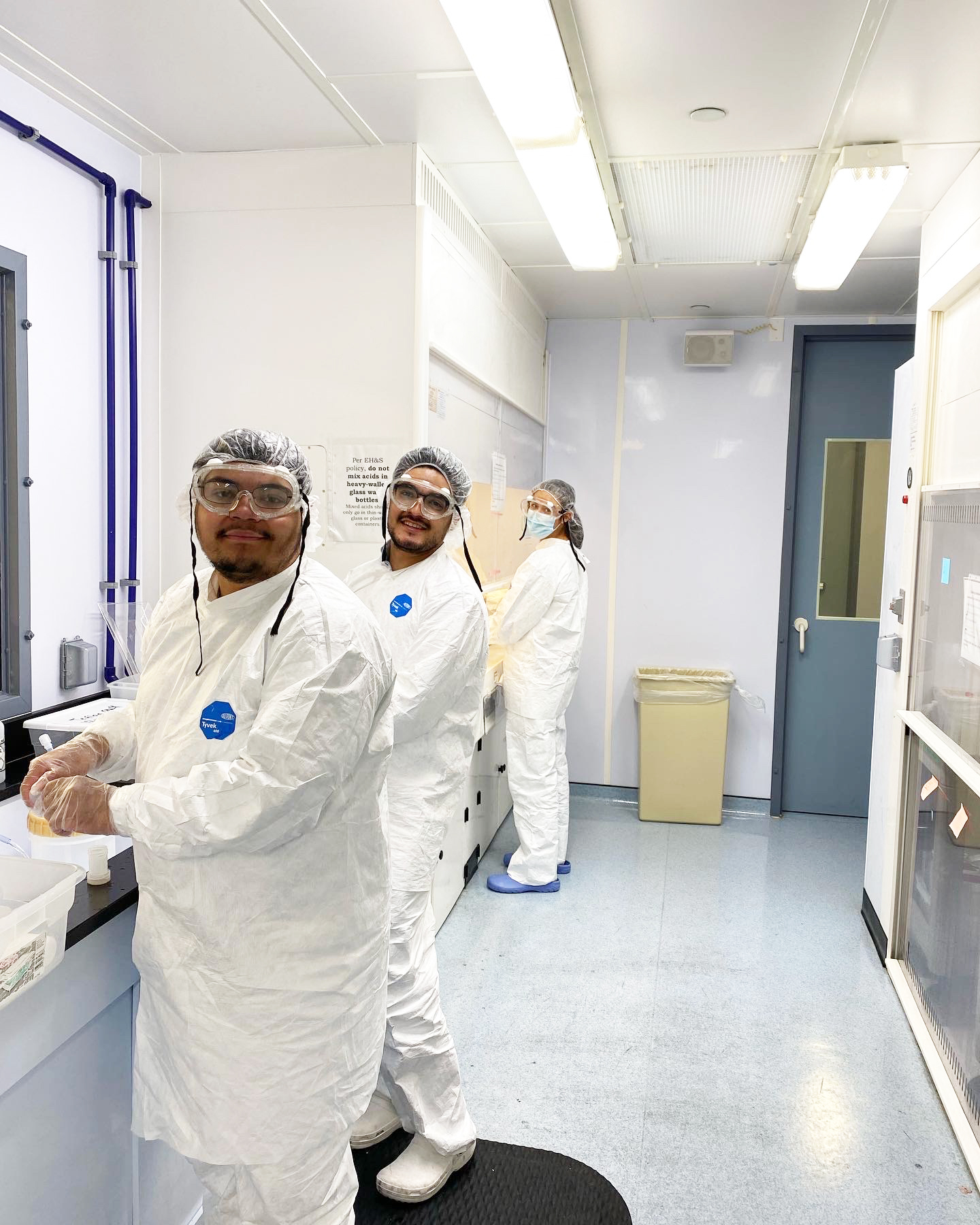School of Molecular Sciences Dean's Medalist is an inspiration to all

Aaron Jafar Hernandez Flores, chemistry major and spring 2022 School of Molecular Sciences Dean’s Medalist. Photo by Mary Zhu/ASU
Editor's note: This story is part of a series of profiles of notable spring 2022 graduates.
Next month, Phoenix native and School of Molecular Sciences Dean’s medalist Aaron Jafar Hernandez Flores will graduate with a bachelor's degree in chemistry.
“Very simply, Aaron is an inspiration,” said Ariel Anbar, President’s Professor in both ASU’s School of Molecular Sciences and the School of Earth and Space Exploration.
Flores started working in the Anbar/METAL supergroup about three years ago as a student researcher and rapidly evolved into an advanced researcher performing beyond the capability of many graduate researchers.
“Everyone in the group has come to respect Aaron, not only because he is smart and determined, and skilled in the lab and with research, but also because he radiates an infectious enthusiasm for learning and for life that elevates everyone around him,” Anbar said.
Flores is a first-generation student from a Latino family who transferred to ASU from community college.
“Aaron has been independent, extremely hard-working and innovative,” said Gwyneth Gordon, assistant research professor in the School of Earth and Space Exploration. “He has suggested modifications to our standard operating procedures to make them more efficient. He is highly self-motivated and required very little supervision once trained and has actively been training other students and users of our facilities.”
Not surprisingly, in January 2022 Flores was awarded the Safety Award for all of the School of Eartha and Space Exploration for proposing and encouraging a substantial cleanup of the facility to remove old users’ samples and expired reagents. His pride in all his work, no matter the level, clearly comes through.
Flores is very proactive in asking questions and is a highly independent thinker. He received a Western Alliance to Expand Student Opportunities grant in fall 2021 and has been working on a research project involving both elemental concentration and isotopic composition in bullets for forensic investigations of shootings for much longer than that.
This impactful project required method development at many levels, including accurate and precise measurement of very low trace metal abundances in a high-lead matrix, as well as sampling method validation of multiple different sample types.
Flores has a strong future career in chemistry. He gave an excellent and well-received oral presentation at the 2022 Winter Conference on Plasma Spectrochemistry and has begun work on turning his research into an article for the Journal of Analytical and Atomic Spectroscopy.
He also gave an oral presentation virtually at the 2022 American Academy of Forensic Sciences conference. He used the winter conference as a networking opportunity and, as a result, has had a number of interviews with instrumentation companies for potential careers after graduation.
Although the Anbar and METAL groups will miss Aaron greatly, they know he has a great future ahead of him. As important, he will be a role model and inspiration to others.
Aaron Jafar Hernandez Flores working in the lab. Photo by Mary Zhu/ASU
Question: What was your “aha” moment when you realized you wanted to study the field you majored in at ASU?
Answer: My “aha moment” was when I was a biology major at ASU West (campus), specifically the semester I was in genetics. During that time, I wanted to go to medical school but while working on my resume I took the opportunity to work at a microbiology lab. Microbiology wasn’t my interest, but I loved doing the research. This got me thinking back to my community college days when I loved my chemistry classes and decided to switch majors to chemistry and work in a chemistry lab at ASU Tempe.
Q: What’s something you learned while at ASU — in the classroom or otherwise — that surprised you or changed your perspective?
A: I think one of the most important things I learned at ASU is that I am capable of great things. I know that sounds egotistical but it’s not like that at all. I learned that I was capable of great things, while working as a wet chemistry lab aide in professor Ariel Anbar’s lab. In that lab I was surrounded by amazing scientists, who I consider family now. I specifically want to shoutout to Gwyneth Gordon as she was my lab manager but more importantly she was my mentor, who always believed in me, trusted me and saw potential in me. Through her I got to experience many different opportunities and when I didn’t think I was capable of doing something or deserving of it, she was always there to push me and to remind that I was capable.
Q: Why did you choose ASU?
A: I chose ASU as I was born and raised in Phoenix, Arizona. My whole family lives in Arizona and this was the closest school to me, so this was the obvious choice. The most important reasons though are that because my family was here, I didn’t have to move out and pay rent, I just had long drives to school. The other reason is that I paid in state tuition.
Q: Which professor taught you the most important lesson while at ASU?
A: My most important professor and more specifically mentor was Gwyneth Gordon. She taught me what I was capable of, but much more than that as well.
Left to right: Dorian Ronquillo-Jocom, Aaron Flores and Zoe Deahl. Flores is training two biochemistry students in the lab. Photo by Mary Zhu/ASU
Q: What’s the best piece of advice you’d give to those still in school?
A: I mean that’s hard as everyone is doing different things, but I think in general the best thing to do is put yourself out there and get involved early. For example, I knew I wanted to work in a chemistry lab and do research, so I just tried to get as much experience as possible. To do that I tried to work in any lab that I could and reached out to several professors for opportunities regardless of whether they were above my level or experience because the worst they could do is say no to me. Apart from that, I would say to be open minded because sometimes things will come to you that you don’t expect. For example, I had no idea about the Anbar lab until Dr. Barbara Munk sent us emails about some jobs that were available on campus. One of them said chemistry so I just applied.
Q: What was your favorite spot on campus, whether for studying, meeting friends or just thinking about life?
A: I mean honestly the lab I worked in as there were some spots to study in there that other students didn’t have access to so when I wanted to study in quiet that was the perfect place. As far as meeting friends and thinking about life the lab was also a great place as I considered all my colleagues as friends and got to ask them about life as well.
Q: What are your plans after graduation?
A: My plans after graduating are to obtain a career in field service engineering and work in that for a while and then come back to pursue my PhD in computational chemistry.
Q: If someone gave you $40 million to solve one problem on our planet, what would you tackle?
A: That’s a tough question as I think there are multiple important problems to solve but also $40 million sounds like a lot of money, but I don’t know if it’s enough to solve systemic issues. Since I can’t decide on one problem, I would say the top three problems for me are climate change, giving everyone in the world free education and battling systemic racism, in no particular order.
More Science and technology

Swarm science: Oral bacteria move in waves to spread and survive
Swarming behaviors appear everywhere in nature — from schools of fish darting in synchrony to locusts sweeping across landscapes…

Stuck at the airport and we love it #not
Airports don’t bring out the best in people.Ten years ago, Ashwin Rajadesingan was traveling and had that thought. Today, he is…

ASU in position to accelerate collaboration between space, semiconductor industries
More than 200 academic, business and government leaders in the space industry converged in Tempe March 19–20 for the third annual…



